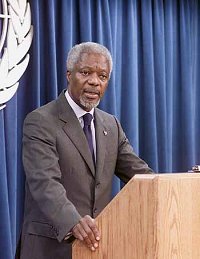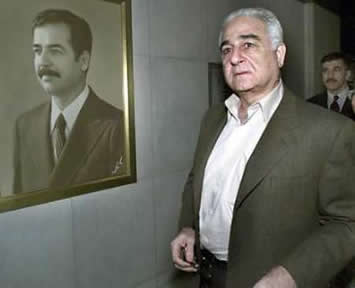Oil-for-Food hits a New York courtroom.
By Claudia Rosett
While United Nations Secretary-General Kofi Annan has already dismissed the Oil-for-Food scandal as over and done, within the wood-paneled walls of a Manhattan courtroom it has just come to life. The opening this week of the first federal trial linked to the U.N.s former relief program for Iraq has transformed the distant saga of sanctions busting and stolen billions into an up-close drama, with prosecutors alleging that Saddam Hussein, in his efforts to shake off U.N. sanctions, reached via a secret back channel all the way from Baghdad right into Washington, New York, and the U.N. executive suite.
The defendant, South Korean businessman Tongsun Park, is charged in the Southern District of New York with acting as an unregistered agent of Saddams Iraq which tried through various means, especially the manipulation of the 1996-2003 Oil-for-Food program, to end the U.N. sanctions imposed after Saddams 1990 invasion of Kuwait. Parks lawyer, Michael Kim, says the 71-year-old Park is absolutely not guilty.
Whatever the outcome for Park, his trial expected to last about three weeks looks likely to provide an unprecedented view into the workings of U.N. backroom politics. Not least, this comes as a timely warning to beware whatever might be going on today in any back channels the U.N. might have opened with nuclear-happy, sanctions-threatened, oil-rich Iran.
In an opening statement Tuesday, federal prosecutor Michael Farbiarz told the jury that Iraqi agents had been working since 1991 to try to eliminate the sanctions, to try and create a major exception to them on the way to wholesale elimination. For five years, Iraq worked without success. But starting in 1996, alleged Farbiarz, The Iraqi cash began flowing to Tongsun Park. It flowed all year long. Sure enough, by the end of that year
the Iraqis got their multibillion dollar exception to the UN sanctions, the so-called Oil-for-Food program.
Alleging that Cash by the bagful was sent from Iraq to the United States and doled out here by an Iraqi agent to Tongsun Park, Farbiarz outlined a tale of secret swaps of messages and money in New York cafes and restaurants; night-time meetings at the Sutton Place official residence of former Secretary-General Boutros Boutros-Ghali; a close encounter with longtime U.N. eminence Maurice Strong, who served as a top adviser to both Boutros-Ghali and then to Kofi Annan; and an episode in which Park in 1997 picked up cash from Saddams number two man in Iraq, Tariq Aziz, and drove out of the Iraqi desert over the Jordanian border. (Boutros-Ghali, Strong, and Annan have all denied any wrong-doing in relation to Oil-for-Food.)
Parks lawyer, Kim, waved aside the prosecutions version of events as sounding like a Tom Clancy novel. Park, he said, was simply a middleman, a facilitator, like everybody else who was involved in the Oil-for-Food program. Positing that the bigger picture was much more complicated than prosecutors would have you believe, Kim promised to map out a web of connections including prominent Republicans who hob-nobbed with the same Iraqi agent alleged to have passed envelopes and bags of cash to Park, and Texas oil companies that saw in Oil-for-Food a huge money-making opportunity.
The biggest eye-opener in the trial so far is the hob-nobbing Iraqi agent, Samir Vincent, 65-years-old, with a shock of silver-gray hair, who on Tuesday took the stand. Born in Baghdad, Vincent became a naturalized U.S. citizen around 1971. Having done substantial business with Iraq over the years, including under Oil-for-Food, he was arrested in January 2005 on federal charges including engaging in prohibited financial transactions with the government of Iraq, and acting as an unregistered agent of Iraq. He pleaded guilty before the same judge now presiding over the Park trial, Denny Chin, and became a cooperating witness.
Speaking in a firm voice, with only a slight accent to suggest his Iraqi origins, Vincent in his testimony on Tuesday outlined a web of connections that led him over many years, via Baghdad and Washington, to Tongsun Park. He came to the U.S. in the late 1950s to attend Boston College, and eventually went into business for himself, in Virginia, just outside Washington. In 1984, he met the then-ambassador of Iraq, Nizar Hamdoon, an alumnus of the same Jesuit high school that Vincent had attended as a young man in Baghdad. They became good friends. Vincent began doing business with Iraq, where Hamdoon by 1990 had become deputy foreign minister. Vincent was in Baghdad when Saddam invaded Kuwait and the U.N. imposed sanctions. In the aftermath, Vincent by his own account became a conduit for messages and money from Baghdad, as Saddams regime sought to slip out from under those sanctions.
In the early 1990s, according to Vincent, this entailed a variety of schemes centered in Washington that simply flopped. In early 1992, he said, he hooked up with a Washington lobbyist, William E. Timmons, who had served as a congressional liaison in the Reagan administration. (Timmons did not return a call yesterday to his office at his Washington firm, Timmons and Company, where he is now listed as Chairman Emeritus). Vincent said that with the help of Timmons, he tried a number of approaches to the State Department, including a request to see John Bolton, currently the U.S. ambassador to the U.N., then assistant secretary for international organization affairs at the State Department. That resulted in meetings with deputies of Bolton, said Vincent, But I never had a chance to meet with Bolton himself.
According to Vincent, Timmons also helped him approach Elizabeth Dole, then head of the American Red Cross, with a proposal that the Red Cross take part in a plan similar to, but on a smaller scale than, what later coalesced under the U.N. as Oil-for-Food. The idea was that Iraq would be allowed to sell a limited amount of oil to buy food and medicine, all coordinated with the Red Cross. Vincent said his understanding, relayed second-hand through Timmons, was that this project died when then-Secretary of State James Baker looked over the proposal and decided it was a no-no because he thought the Iraqis were trying to circumvent sanctions. Bakers view, according to Vincent, was that if this has any chance, it has to be done under the United Nations auspices.
By late 1992, according to Vincent, he and Timmons concluded that the U.S. State Department would not play ball, and Iraq should look directly to the U.N. Thus, Vincent needed access to the upper reaches of the U.N., and it was at that point, he testified Tuesday, that Timmons introduced him to Tongsun Park. Within a few weeks, Park had arranged a meeting for us with the Secretary-General of the United Nations at the United Nations headquarters. On that occasion, according to Vincent, it was only Park who actually went in to speak with Boutros-Ghali; Vincent waited in the outer office. But the stage was set for a series of secret meetings and maneuverings, of which we shall no doubt be hearing more in coming days.
Parks lawyer, Michael Kim, who has not yet really begun to fight, may well produce evidence at odds with the picture that the prosecutors and Samir Vincent have begun to present. For public consumption, Tongsun Park appears to have launched his own website, complete with the information that he is a unique personality known around the world, but remains humble and is always an especially gracious host. (His lawyer, in a phone interview Tuesday evening, could not confirm that this is genuinely Parks website, and Park, who is in federal custody, could not be reached for comment.)
Even after this very preliminary bout, what jumps out is that, in contrast to the folks at the U.N., at least some of the private players who got caught up in the epic scandal that was Oil-for-Food have by now had to tangle with prosecutors, or at least have been required to face inquiries conducted in broad daylight. Also under federal indictment are a number of Saddams former business partners, who face trial in the Southern District of New York this November. In Australia, the Cole Commission has been delving in public hearings into misconduct under Oil-for-Food.
But at the U.N. itself, which actually ran Oil-for-Food, not a single official involved in the administration of the program, from Kofi Annan on down, has been required to come forth and tell, in public, the truth, the whole truth, and nothing but the truth. Top U.N. officials have declined invitations to testify at congressional hearings and stonewalled questions from the press. They have tucked under the rug of diplomatic immunity and silence a great many loose ends left by Paul Volckers U.N.-authorized probe, which covered some of the material now spilling into the New York courtroom, but did all its questioning in secret and is now hiding from the public its entire archive of underlying documents. No one at Turtle Bay seems even interested that the former director of Oil-for-Food, Benon Sevan, alleged by Volcker to have taken $147,000 in payoffs on Iraqi oil deals, is protesting innocence, uncontested, receiving full U.N. pension and living on Cyprus. Watching Tongsun Park's trial begin on Tuesday, and listening to testimony that is opening one can of worms after another, I had to wonder, were the U.N. subject to a similar standard of law, what might we learn? |
 The former United Nations oil-for-food chief was charged Tuesday with bribery and conspiracy to commit wire fraud for his role in the scandal-tainted humanitarian program. The charges against Benon Sevan, 69, of Nicosia, Cyprus, were contained in a rewrite of an indictment stemming from the scandal over the operation set up from 1996 to 2003 to permit the Iraqi government to sell oil primarily to buy food and medicine for suffering Iraqis. Sevan, who had worked for the U.N. for 40 years
The former United Nations oil-for-food chief was charged Tuesday with bribery and conspiracy to commit wire fraud for his role in the scandal-tainted humanitarian program. The charges against Benon Sevan, 69, of Nicosia, Cyprus, were contained in a rewrite of an indictment stemming from the scandal over the operation set up from 1996 to 2003 to permit the Iraqi government to sell oil primarily to buy food and medicine for suffering Iraqis. Sevan, who had worked for the U.N. for 40 years 
 STAFF at the United Nations headquarters in New York claimed tens of thousands of pounds in school fees for non-existent children, one of its most senior auditors has revealed. Hundreds of employees also defrauded US tax authorities by claiming refunds for mortgage interest and property taxes that should have gone to the UN.
STAFF at the United Nations headquarters in New York claimed tens of thousands of pounds in school fees for non-existent children, one of its most senior auditors has revealed. Hundreds of employees also defrauded US tax authorities by claiming refunds for mortgage interest and property taxes that should have gone to the UN. 
 At the United Nations, as a year of many scandals draws to a close, Secretary-General Kofi Annan has been trying to stuff some big unanswered questions down the memory hole--with mixed results. No, I'm not talking only about the files Mr. Annan's former chief of staff shredded during the Oil for Food investigation, or the discounted duty-free Mercedes allegedly shipped to Ghana in late 1998 by the secretary-general's son, Kojo Annan, under false use of his father's name and diplomatic perquisites. Hanging over all this is another mystery that despite the magnitude of the question seems of strangely small concern to the secretary-general: What has become of the former head of the U.N. Oil for Food program,
At the United Nations, as a year of many scandals draws to a close, Secretary-General Kofi Annan has been trying to stuff some big unanswered questions down the memory hole--with mixed results. No, I'm not talking only about the files Mr. Annan's former chief of staff shredded during the Oil for Food investigation, or the discounted duty-free Mercedes allegedly shipped to Ghana in late 1998 by the secretary-general's son, Kojo Annan, under false use of his father's name and diplomatic perquisites. Hanging over all this is another mystery that despite the magnitude of the question seems of strangely small concern to the secretary-general: What has become of the former head of the U.N. Oil for Food program,  Now that Dubya has written a blank check for the Second Reconstruction of the South, we have to determine who will manage the most expensive federal program in history. In the interest of efficiency, why not turn the project over to a Manhattan grand jury and cut out the middle men? There are middle men (and women) aplenty lining up to make this project not only the most expensive, but the most corrupt in U.S. history. Not, surely, throughout the South. But certainly in the state that could qualify as a banana republic if only it grew some bananas. Louisiana's state and city governments are preparing to let the good times roll again.
Now that Dubya has written a blank check for the Second Reconstruction of the South, we have to determine who will manage the most expensive federal program in history. In the interest of efficiency, why not turn the project over to a Manhattan grand jury and cut out the middle men? There are middle men (and women) aplenty lining up to make this project not only the most expensive, but the most corrupt in U.S. history. Not, surely, throughout the South. But certainly in the state that could qualify as a banana republic if only it grew some bananas. Louisiana's state and city governments are preparing to let the good times roll again. THE PRESIDENT ASSURED US THAT the enormous federal expenditures will be overseen by a collection of tough inspectors general. That's a good idea, but it's not nearly enough. Those such as Gov.
THE PRESIDENT ASSURED US THAT the enormous federal expenditures will be overseen by a collection of tough inspectors general. That's a good idea, but it's not nearly enough. Those such as Gov.